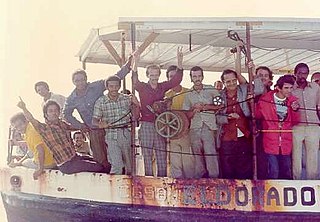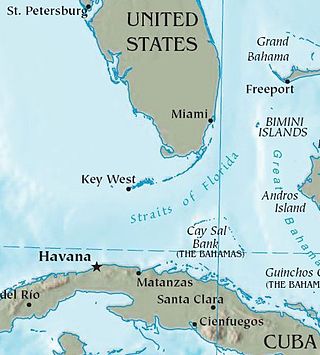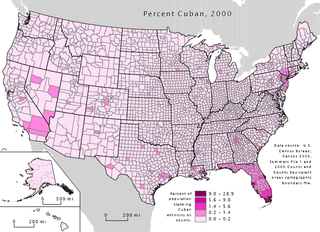Related Research Articles

The Mariel boatlift was a mass emigration of Cubans who traveled from Cuba's Mariel Harbor to the United States between April 15 and October 31, 1980. The term "Marielito" is used to refer to these refugees in both Spanish and English. While the exodus was triggered by a sharp downturn in the Cuban economy, it followed on the heels of generations of Cubans who had immigrated to the United States in the preceding decades.

Dante Bruno Fascell was an American politician who represented Florida as a member of the United States House of Representatives from 1955 to 1993. He served as chairman of the House Foreign Affairs Committee for nine years.

South Florida, sometimes colloquially shortened to SoFlo, is the southernmost region of the U.S. state of Florida. It is one of Florida's three most commonly referred to directional regions; the two others are Central Florida and North Florida. South Florida is the southernmost part of the continental United States and the only region of the continental U.S. that includes some areas with a tropical climate.

Cuban Americans are Americans who immigrated from or are descended from immigrants from Cuba, regardless of racial or ethnic origin. As of 2022, Cuban Americans were the fourth largest Hispanic and Latino American group in the United States after Mexican Americans, Stateside Puerto Ricans and Salvadoran Americans.

The Cuban exodus is the mass emigration of Cubans from the island of Cuba after the Cuban Revolution of 1959. Throughout the exodus, millions of Cubans from diverse social positions within Cuban society emigrated within various emigration waves, due to political repression and disillusionment with life in Cuba.

The Inter-American Foundation, or IAF, is an independent agency of the United States government that funds community-led development in Latin America and the Caribbean. It was created through the Foreign Assistance Act of 1969 as an alternative to traditional foreign assistance that operates government-to-government on a much larger scale. The IAF receives its funds through annual appropriations by Congress. Until 2019, the agency also received annual reflows from the Social Progress Trust Fund administered by the Inter-American Development Bank consisting of repayments on U.S. government loans extended under the Alliance for Progress to various Latin American and Caribbean governments. Since beginning operations in 1972, the IAF has awarded more than 5,700 grants worth more than $940 million.
The Cuban–American lobby are various groups of Cuban exiles in the United States and their descendants who have historically influenced the United States' policy toward Cuba. In general usage, this refers to anti-Castro groups.

North American Congress in Latin America (NACLA) is a non-profit organization founded in 1966 to provide information on trends in Latin America and relations between Latin America and the United States. The organization is best known for publishing the quarterly NACLA Report on the Americas, and also publishes "books, anthologies and pamphlets for classroom and activist use". The NACLA Report on the Americas print magazine was briefly discontinued in 2015, but relaunched under the Taylor and Francis imprint Routledge in May 2016.
TransAfrica is an advocacy organization in Washington, D.C. that seeks to influence the foreign policy of the United States concerning African and Caribbean countries and all African diaspora groups. They are a research, education, and advocacy center for activism focusing on social, economic and political conditions in Africa, the Caribbean, and Latin America and other parts of the African Diaspora. They are the largest and oldest social justice organization in the United States that focuses on the African world. They have served as a major research, educational, and organizing institution for the African and African Descendant communities and the U.S. public in general.
Mario Algaze was a Cuban-American photographer who photographed musicians and celebrities, in rural and urban areas, throughout Latin America.

Cuban immigration has greatly affected Miami-Dade County since 1959, creating what is known as "Cuban Miami." However, Miami reflects global trends as well, such as the growing trends of multiculturalism and multiracialism; this reflects the way in which international politics shape local communities.
Jorge I. Domínguez, a scholar of Latin American studies in the United States, taught at Harvard University from 1972 to 2018, when he retired as the Antonio Madero Professor for the Study of Mexico.

The University of Florida Center for Latin American Studies is one of the largest centers in the United States for the study of Latin American, Caribbean, and Latino Studies. Specialized degrees are offered in a wide range of subjects including the anthropology, history, sociology, politics, geography, and languages of the region.

The University of Pittsburgh’s Center for Latin American Studies, commonly known as CLAS, is a National Resource Center on Latin America. The Center, founded in 1964 as part of the university's Center for International Studies, offers undergraduate and graduate students multidisciplinary training on Latin American and Caribbean studies.

Teo A. Babun is a Cuban-American businessman, evangelical philanthropist, and human rights advocate. He is the founder of BG Consultants and Cuba-Caribbean Development Co. and also the head of Outreach Aid to the Americas (OAA) and AmericasRelief.
The following is a timeline of the history of the city of Miami in Miami-Dade County, Florida, United States.
Media in Miami, Florida, United States, includes newspapers, magazines, Internet-based web sites, radio, television, and cinema. Florida produces some of its own media, while some comes from outside the state for Floridian consumption.

Jesús A. Permuy is a Cuban-American architect, urban planner, human rights activist, art collector, and businessman. He is known for an extensive career of community projects and initiatives in Florida, Washington, D.C., and Latin America.

Francisco O. "Frank" Mora is an American academic who has served as the United States ambassador to the Organization of American States since January 2023.
Ambler Hodges Moss Jr. was an American diplomat, lawyer and Professor of International Studies in the University of Miami. He served as the ambassador of the United States to Panama. He was known for his involvement towards the negotiation of The Panama Canal Treaty. Moss was initially the Dean of International Studies in the University of Miami.
References
- ↑ The 1991 Act of Congress Archived September 24, 2004, at the Wayback Machine did not specify that the North-South Center would be at the University of Miami: "The purpose of this section is to promote better relations between the United States and the nations of Latin America and the Caribbean and Canada through cooperative study, training, and research, by supporting in Florida a Center for Cultural and Technical Interchange Between North and South where scholars and students in various fields from the nations of the hemisphere may study, give and receive training, exchange ideas and views, and conduct other activities consistent with the objectives of the Mutual Educational and Cultural Exchange Act of 1961 [22 U.S.C. 2451 et seq.] and other Acts promoting international, educational, cultural, scientific, and related activities of the United States." Language in Congressional appropriations bills for Commerce, State and Justice, provided funding to the University of Miami in the form of a grant contract.
- ↑ The Miami Herald, September 4, 2003.
- ↑ The Associated Press (April 10, 2003). "Academics fired at U. of Miami think tank". Sarasota Herald Tribune. Retrieved February 16, 2018.